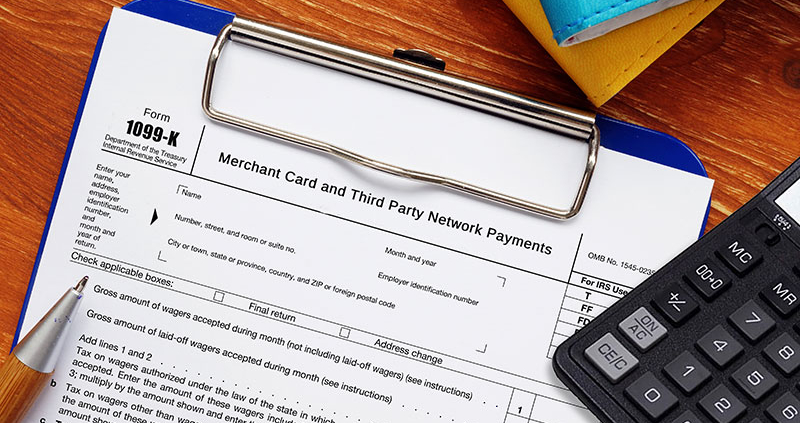Do 1099-K Threshold Changes Affect Your Small Business?
Many people are concerned about confusing new IRS regulations regarding Form 1099-K requirements. Here’s what your small business needs to know.
Beginning in 2022, the IRS has lowered the threshold for reporting what are broadly called “third-party payment settlement entities” on Form 1099-K. It was a steep drop — from $20,000 all the way down to $600.
This change, part of the American Rescue Plan Act of 2021, sent a shock wave through the small-business community and beyond. A requirement that had previously applied to few small businesses now seemingly applies to almost all of them. Let’s take a closer look at what the change means.
1099-NEC vs. 1099-K
Like most IRS regulations, this one can be confusing. Each year, businesses are required to send 1099-NEC forms to vendors and independent contractors that were paid at least $600 in a tax year for services. Form 1099-K is sent by credit card companies and third-party processors — think Venmo or PayPal — to report payment transactions they process for retailers or other third parties. These notifications assist people in preparing their taxes easily and accurately.
Form 1099-K isn’t new. This section of the IRS code, 6050W, originally went into effect in 2012 for transactions completed in 2011. And while the regulation applies to all businesses receiving payment via credit cards or using third-party settlement organizations (TPSOs) that pay for goods or services, the de minimis exception of 200 such transactions exceeding $20,000 in gross income meant that only a handful received Form 1099-K.
Effective January 1, 2022, however, the de minimis amount dropped to just $600 for all taxable income received via payments by credit card or a TPSO. So while you may not have received Form 1099-K in the past, you may receive one now that the threshold for reporting has changed.
How Will This Impact Your Small Business?
The good news is that the change is unlikely to increase the actual tax burden that the average small business faces. Form 1099-K is an information document that is used in conjunction with your financial records to determine your correct taxable income.
However, the change does impose an increased administrative headache to business owners, since the 1099-K will reflect the gross value of transactions processed on your behalf. The U.S. Treasury will feel the pain as well. A National Taxpayers Union Foundation issue brief declared that it “is likely to flood both taxpayers and the IRS itself with paperwork — despite the fact that much of the activity described on the forms won’t even yield income tax obligations.”
A lobbying effort is underway to persuade Congress to rescind the threshold change or at least make the decrease less precipitous — to, say, $5,000 instead of $600.
What Can You Do About It?
What can a small-business leader do while waiting to see how this all shakes out? The first step: Get help from a professional. Ensuring your books and financial recording are accurate should reduce any surprises when 1099-Ks are received.
Keep in mind that online tools are available to process automated clearinghouse (ACH) transactions such as credit card payments, along with the reporting. In the past, we’ve recommended such tools because they’re paperless and offer increased security. Now there’s another compelling reason: Automated record-keeping makes it much easier to comply with the new threshold and manage the review of the anticipated influx of Form 1099-K reporting requirements.
So Many Questions …
Another big question is: Why would lawmakers impose such an onerous burden on small businesses for so little benefit? Turns out the new regulation falls under the law of unintended consequences. The real object of the revised threshold is underreported income in the so-called gig economy. Independent contractors such as Uber drivers are often compensated via TPSOs. The language is so broad, however, that it casts an unnecessarily wide net over small businesses.
The IRS seems to have realized the confusion the new reporting requirement has created. There are 32 entries on the agency’s website under FAQs regarding this regulation. One example: “Are purchases made with stored-value cards or gift cards reportable transactions?” The actual IRS answer: “It depends.” Such transactions are reportable “when the stored-value card is accepted by a network of persons unrelated to the issuer and each other. For the definition of unrelated person see section 267(b) of the Internal Revenue Code, including the application of section 267(b) and (e)(3), or section 707(b)(1).”
Be Proactive
So: Yes, this is a complicated regulation. All the more reason to hope Congress overturns it. In the meantime, small businesses have more reason than ever to get support from an outsourced bookkeeping services professional and automate their reporting.




Leave a Reply
Want to join the discussion?Feel free to contribute!